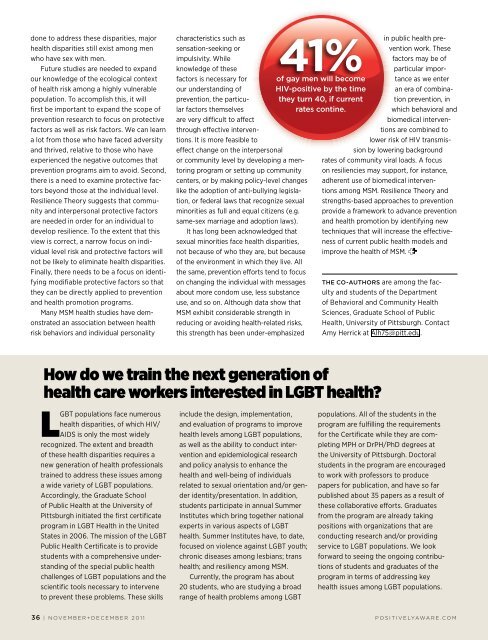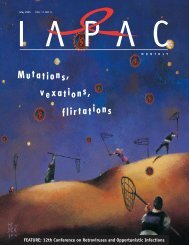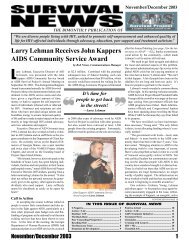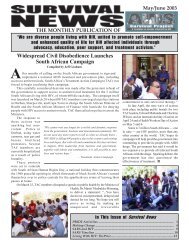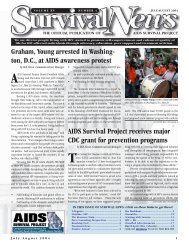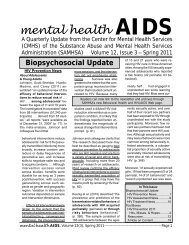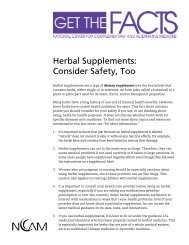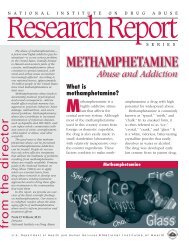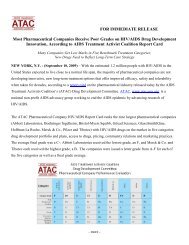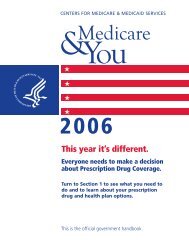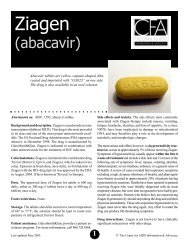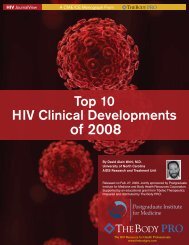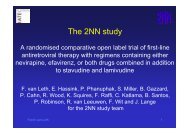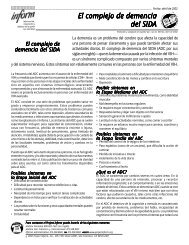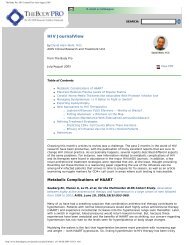Briefly - CD8 T cells - The Body
Briefly - CD8 T cells - The Body
Briefly - CD8 T cells - The Body
Create successful ePaper yourself
Turn your PDF publications into a flip-book with our unique Google optimized e-Paper software.
done to address these disparities, major<br />
health disparities still exist among men<br />
who have sex with men.<br />
Future studies are needed to expand<br />
our knowledge of the ecological context<br />
of health risk among a highly vulnerable<br />
population. To accomplish this, it will<br />
first be important to expand the scope of<br />
prevention research to focus on protective<br />
factors as well as risk factors. We can learn<br />
a lot from those who have faced adversity<br />
and thrived, relative to those who have<br />
experienced the negative outcomes that<br />
prevention programs aim to avoid. Second,<br />
there is a need to examine protective factors<br />
beyond those at the individual level.<br />
Resilience <strong>The</strong>ory suggests that community<br />
and interpersonal protective factors<br />
are needed in order for an individual to<br />
develop resilience. To the extent that this<br />
view is correct, a narrow focus on individual<br />
level risk and protective factors will<br />
not be likely to eliminate health disparities.<br />
Finally, there needs to be a focus on identifying<br />
modifiable protective factors so that<br />
they can be directly applied to prevention<br />
and health promotion programs.<br />
Many MSM health studies have demonstrated<br />
an association between health<br />
risk behaviors and individual personality<br />
characteristics such as<br />
sensation-seeking or<br />
impulsivity. While<br />
knowledge of these<br />
factors is necessary for<br />
our understanding of<br />
prevention, the particular<br />
factors themselves<br />
are very difficult to affect<br />
through effective interventions.<br />
It is more feasible to<br />
effect change on the interpersonal<br />
or community level by developing a mentoring<br />
program or setting up community<br />
centers, or by making policy-level changes<br />
like the adoption of anti-bullying legislation,<br />
or federal laws that recognize sexual<br />
minorities as full and equal citizens (e.g.<br />
same-sex marriage and adoption laws).<br />
It has long been acknowledged that<br />
sexual minorities face health disparities,<br />
not because of who they are, but because<br />
of the environment in which they live. All<br />
the same, prevention efforts tend to focus<br />
on changing the individual with messages<br />
about more condom use, less substance<br />
use, and so on. Although data show that<br />
MSM exhibit considerable strength in<br />
reducing or avoiding health-related risks,<br />
this strength has been under-emphasized<br />
How do we train the next generation of<br />
health care workers interested in LGBT health?<br />
LGBT populations face numerous<br />
health disparities, of which HIV/<br />
AIDS is only the most widely<br />
recognized. <strong>The</strong> extent and breadth<br />
of these health disparities requires a<br />
new generation of health professionals<br />
trained to address these issues among<br />
a wide variety of LGBT populations.<br />
Accordingly, the Graduate School<br />
of Public Health at the University of<br />
Pittsburgh initiated the first certificate<br />
program in LGBT Health in the United<br />
States in 2006. <strong>The</strong> mission of the LGBT<br />
Public Health Certificate is to provide<br />
students with a comprehensive understanding<br />
of the special public health<br />
challenges of LGBT populations and the<br />
scientific tools necessary to intervene<br />
to prevent these problems. <strong>The</strong>se skills<br />
include the design, implementation,<br />
and evaluation of programs to improve<br />
health levels among LGBT populations,<br />
as well as the ability to conduct intervention<br />
and epidemiological research<br />
and policy analysis to enhance the<br />
health and well-being of individuals<br />
related to sexual orientation and/or gender<br />
identity/presentation. In addition,<br />
students participate in annual Summer<br />
Institutes which bring together national<br />
experts in various aspects of LGBT<br />
health. Summer Institutes have, to date,<br />
focused on violence against LGBT youth;<br />
chronic diseases among lesbians; trans<br />
health; and resiliency among MSM.<br />
Currently, the program has about<br />
20 students, who are studying a broad<br />
range of health problems among LGBT<br />
41%<br />
of gay men will become<br />
hIV-positive by the time<br />
they turn 40, if current<br />
rates contine.<br />
in public health prevention<br />
work. <strong>The</strong>se<br />
factors may be of<br />
particular importance<br />
as we enter<br />
an era of combination<br />
prevention, in<br />
which behavioral and<br />
biomedical interventions<br />
are combined to<br />
lower risk of HIV transmission<br />
by lowering background<br />
rates of community viral loads. A focus<br />
on resiliencies may support, for instance,<br />
adherent use of biomedical interventions<br />
among MSM. Resilience <strong>The</strong>ory and<br />
strengths-based approaches to prevention<br />
provide a framework to advance prevention<br />
and health promotion by identifying new<br />
techniques that will increase the effectiveness<br />
of current public health models and<br />
improve the health of MSM. e<br />
<strong>The</strong> Co-auThors are among the faculty<br />
and students of the Department<br />
of Behavioral and Community Health<br />
Sciences, Graduate School of Public<br />
Health, University of Pittsburgh. Contact<br />
Amy Herrick at Alh75@pitt.edu.<br />
populations. All of the students in the<br />
program are fulfilling the requirements<br />
for the Certificate while they are completing<br />
MPH or DrPH/PhD degrees at<br />
the University of Pittsburgh. Doctoral<br />
students in the program are encouraged<br />
to work with professors to produce<br />
papers for publication, and have so far<br />
published about 35 papers as a result of<br />
these collaborative efforts. Graduates<br />
from the program are already taking<br />
positions with organizations that are<br />
conducting research and/or providing<br />
service to LGBT populations. We look<br />
forward to seeing the ongoing contributions<br />
of students and graduates of the<br />
program in terms of addressing key<br />
health issues among LGBT populations.<br />
36 | N O V E M B E R + D E C E M B E R 2 0 1 1 P O s i t i V E lyAwA R E . C O M


